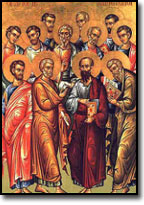The Apostles’ Creed
The Apostles’ Creed
 Next to the Nicene Creed, the Apostles’ Creed is the most universally accepted doctrinal statement in Christendom. It grew from a baptismal formula, and is now often incorporated in the liturgy of regular Sunday services.
Next to the Nicene Creed, the Apostles’ Creed is the most universally accepted doctrinal statement in Christendom. It grew from a baptismal formula, and is now often incorporated in the liturgy of regular Sunday services.
As early as the second half of the second century, Christians seemed to take for granted a summary of Christian doctrine called "the rule of faith." This was not the Apostles’ Creed in its later, more developed form. It was however, in various forms, an outline, a summary, a compendium of Christian teaching embodying the teaching of the apostles and useful for training new Christians.1

I believe in God, the Father Almighty, the Creator of heaven and earth, and in Jesus Christ, His only Son, our Lord: Who was conceived of the Holy Spirit, born of the Virgin Mary, suffered under Pontius Pilate, was crucified, died, and was buried. He descended into hell.
The third day He arose again from the dead. He ascended into heaven and sits at the right hand of God the Father Almighty, whence He shall come to judge the living and the dead.
I believe in the Holy Spirit, the holy catholic church2, the communion of saints, the forgiveness of sins, the resurrection of the body, and life everlasting.
Amen.

1 Presbyterian Creeds, A Guide to the Book of Confessions. Jack Rogers. 1985. The Westminster Press
2 The word "catholic" does not refer to the Roman Catholic Church, but rather, the Universal Church – the entire Body of Christ as a whole.


